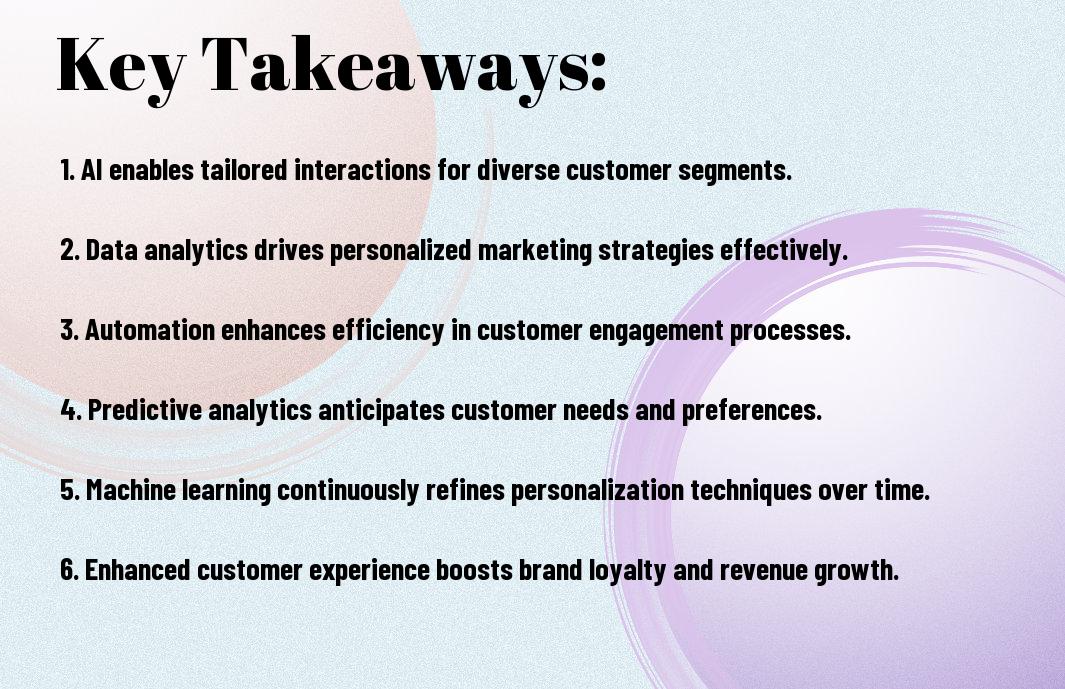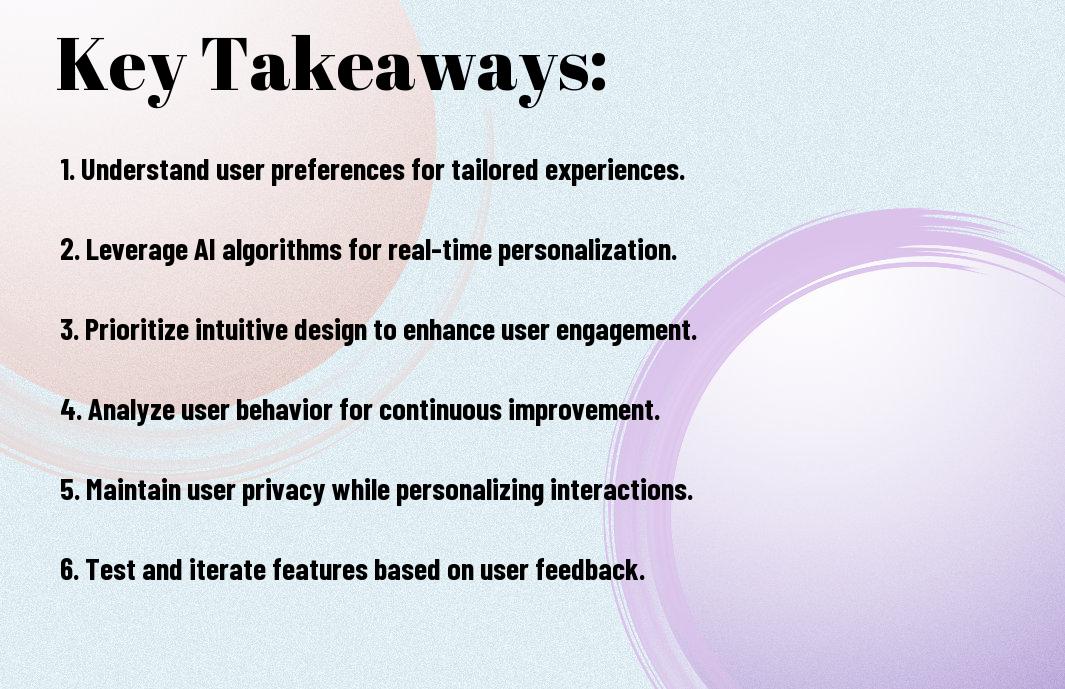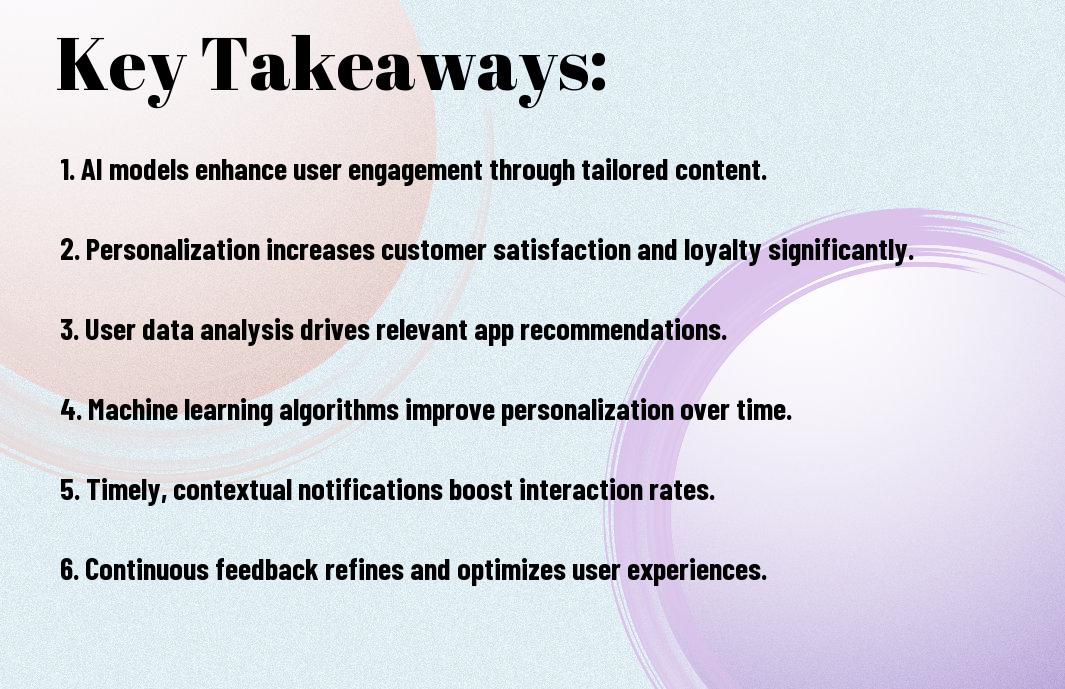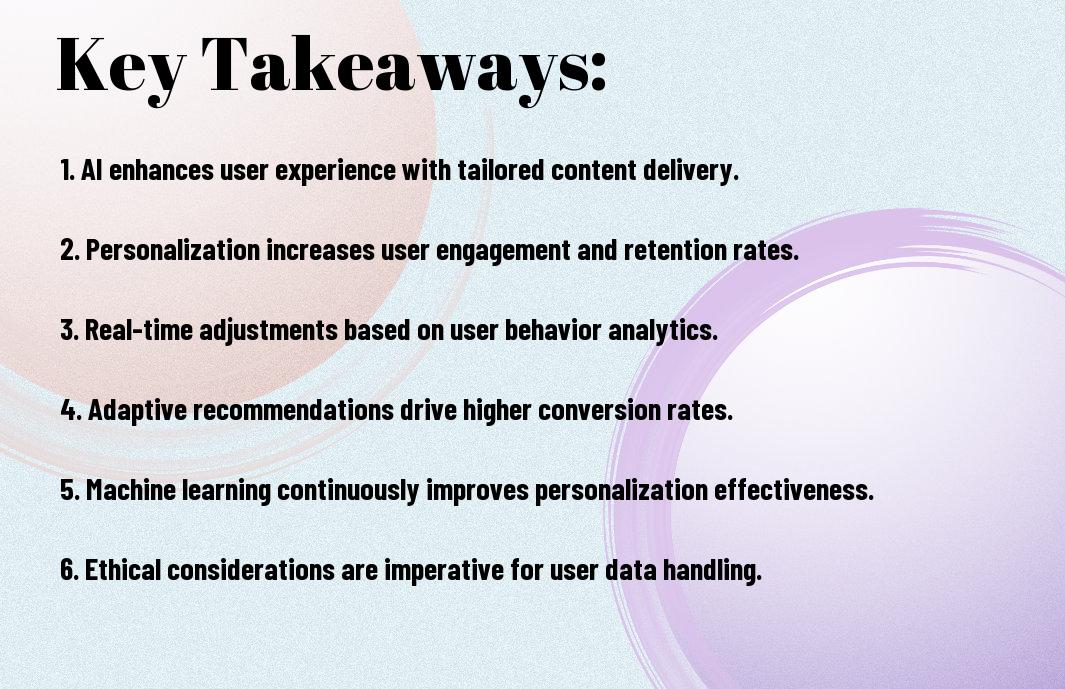As you navigate the ever-evolving marketing landscape, you’re likely aware that delivering personalized experiences is key to captivating your audience. Your customers expect tailored interactions that reflect their unique preferences and behaviors. With the advent of AI, you can now achieve personalization at scale, revolutionizing the way you connect with your customers and driving meaningful engagement. You’ll discover how AI-powered solutions are transforming the marketing landscape, enabling you to create bespoke experiences that foster loyalty and drive growth.
Key Takeaways:
- AI-driven personalization is revolutionizing the marketing landscape by enabling businesses to deliver tailored experiences to individual customers, leading to increased engagement and loyalty.
- Advanced algorithms and machine learning capabilities allow marketers to analyze vast amounts of customer data, identify patterns, and create targeted campaigns that resonate with specific audience segments.
- The integration of AI in marketing automation enables companies to scale personalization efforts, streamlining processes and improving efficiency, while also providing real-time insights to inform future marketing strategies.

The Evolution of Customer Experience
A significant shift has occurred in the way businesses approach customer experience, and you are now expected to deliver personalized interactions at every touchpoint.
From Mass Marketing to Individual Attention
Marketers have moved away from traditional mass marketing techniques, focusing instead on providing your customers with unique experiences tailored to their needs and preferences, allowing you to build stronger relationships with them.
The Digital Transformation Catalyst
At the heart of this transformation is technology, which has enabled you to collect and analyze vast amounts of customer data, allowing for more targeted and effective marketing strategies that meet your customers’ evolving expectations.
In fact, as you examine deeper into the digital transformation, you will find that it has not only changed the way you interact with your customers but also raised the bar for customer experience, making it imperative for you to stay ahead of the curve and adapt to the latest trends and technologies to remain competitive.
AI’s Role in Modern Personalization
There’s no denying that AI has revolutionized the way you approach customer experience in marketing, enabling you to tailor your interactions to individual preferences and behaviors, thereby enhancing your overall marketing strategy.
Machine Learning Algorithms
With the help of machine learning algorithms, you can analyze vast amounts of data and identify patterns that inform your personalization efforts, allowing you to create more targeted and effective marketing campaigns that resonate with your audience.
Predictive Analytics Systems
At the heart of AI-driven personalization are predictive analytics systems that enable you to forecast customer behavior and tailor your marketing efforts accordingly, giving you a competitive edge in the market and allowing you to stay ahead of the curve.
And as you investigate deeper into predictive analytics systems, you’ll discover that they can help you identify high-value customer segments, anticipate their needs, and deliver personalized experiences that drive engagement, loyalty, and ultimately, revenue growth, enabling you to maximize your marketing ROI and achieve your business goals.
Data Collection and Pattern Recognition
Now that you’re exploring personalization at scale, you need to understand how AI collects and analyzes data to shape customer experiences. This involves gathering information from various sources, identifying patterns, and using them to inform marketing strategies.
Customer Behavior Tracking
Analyzing customer behavior helps you understand their preferences and tailor your approach. You can track their interactions with your brand, including website visits, social media engagement, and purchase history, to create a comprehensive picture of their needs and interests.
Real-time Analytics Implementation
Right away, you can implement real-time analytics to monitor customer interactions and respond promptly to their needs. This enables you to adjust your marketing strategies in real-time, ensuring that you’re always providing relevant and personalized experiences.
Recognition of patterns in customer behavior is key to successful real-time analytics implementation. As you collect and analyze data, you can identify trends and anomalies, allowing you to refine your marketing approach and improve customer satisfaction. You can use this information to create targeted campaigns, offer personalized recommendations, and enhance the overall customer experience, driving loyalty and revenue growth for your business.
Personalization Technologies
Keep in mind that personalization technologies are the backbone of your marketing strategy, enabling you to deliver tailored experiences to your customers. You can leverage these technologies to analyze customer data, behavior, and preferences, and create targeted campaigns that drive engagement and conversion.
Recommendation Engines
Personalizing your approach to customer interaction, you can use recommendation engines to suggest products or services based on their interests and purchase history, making your marketing efforts more effective and relevant to your audience.
Dynamic Content Delivery
Optimizing your content strategy, you can use dynamic content delivery to serve personalized content to your customers in real-time, ensuring that your message resonates with them and addresses their specific needs.
It allows you to create a unique experience for each customer, taking into account their location, device, and behavior, and adjusting your content accordingly, enabling you to build a stronger connection with your audience and drive business results.
Customer Journey Optimization
Despite the complexity of customer journeys, AI-powered tools can help you optimize each stage, from awareness to conversion, by analyzing customer behavior and preferences.
Touchpoint Personalization
Across various touchpoints, you can leverage AI to deliver personalized experiences, tailoring your message and content to individual customers, increasing engagement and loyalty.
Cross-channel Experience Integration
To create a seamless experience, you need to integrate your channels, ensuring consistency and cohesion across online and offline interactions, which AI can facilitate by analyzing customer data and behavior.
Integration of cross-channel experiences allows you to understand your customers’ preferences and behaviors, enabling you to deliver a unified and personalized experience, which you can achieve by using AI to analyze customer interactions and tailor your marketing strategy accordingly, helping you to build stronger relationships with your customers.

Privacy and Ethical Considerations
Many marketers are now faced with the challenge of balancing personalization with privacy concerns, as you collect and analyze large amounts of customer data to create targeted experiences.
Data Protection Measures
Along with the increasing use of AI, you need to implement robust data protection measures to safeguard your customers’ sensitive information and maintain their trust.
Transparent AI Practices
Across the marketing landscape, you are expected to prioritize transparency in your AI-driven initiatives, ensuring that your customers understand how their data is being used to personalize their experiences.
This transparency is necessary in building trust with your audience, as you provide them with clear explanations of how AI algorithms make decisions and offer choices to opt-out of personalized experiences, giving you control over your data and preferences, allowing you to make informed decisions about your interactions with your brand.
To wrap up
Presently, you can leverage AI to deliver personalized experiences at scale, revolutionizing your marketing strategy. As you explore the potential of AI in customer experience, you’ll find that it enables you to tailor interactions to individual preferences. To learn more about How AI is Transforming Customer Experience for Businesses, you can discover new ways to enhance your customer experience, ultimately driving loyalty and growth for your business.
FAQ
Q: What is personalization at scale in marketing, and how does it impact customer experience?
A: Personalization at scale refers to the ability of businesses to tailor their marketing efforts to individual customers on a large scale, using data and analytics to create unique experiences. This approach has revolutionized the way companies interact with their customers, enabling them to deliver targeted and relevant content, offers, and recommendations that meet their specific needs and preferences, leading to increased customer satisfaction, loyalty, and ultimately, revenue growth.
Q: How does AI contribute to personalization at scale in marketing, and what are its key benefits?
A: Artificial Intelligence (AI) plays a significant role in personalization at scale by analyzing vast amounts of customer data, identifying patterns, and making predictions about individual behavior. AI-powered algorithms enable businesses to automate and optimize their marketing efforts, providing real-time personalized recommendations, content, and offers to customers across various channels. The key benefits of AI-driven personalization include enhanced customer experience, improved conversion rates, increased efficiency, and reduced costs.
Q: What types of data do marketers use to create personalized customer experiences at scale, and how is it collected?
A: Marketers use various types of data to create personalized customer experiences, including demographic, behavioral, transactional, and preference data. This data is collected from multiple sources, such as customer interactions, website analytics, social media, customer relationship management (CRM) systems, and loyalty programs. Additionally, businesses may also leverage external data sources, like market research and social media listening tools, to gain a deeper understanding of their customers’ needs and preferences.
Q: How do AI-powered chatbots and virtual assistants contribute to personalized customer experience in marketing?
A: AI-powered chatbots and virtual assistants are increasingly being used in marketing to provide personalized customer experiences. These tools use natural language processing (NLP) and machine learning algorithms to understand customer inquiries, preferences, and behavior, enabling them to offer tailored responses, recommendations, and support. By leveraging chatbots and virtual assistants, businesses can provide 24/7 customer support, improve response times, and enhance the overall customer experience, leading to increased satisfaction and loyalty.
Q: What are the future implications of AI-driven personalization at scale in marketing, and how will it continue to evolve?
A: The future of AI-driven personalization at scale in marketing holds significant promise, with ongoing advancements in AI, machine learning, and data analytics expected to drive even more sophisticated and effective personalized experiences. As businesses continue to invest in AI-powered marketing technologies, we can expect to see increased use of emerging technologies like augmented reality, virtual reality, and the Internet of Things (IoT) to create immersive and interactive customer experiences. Moreover, the integration of AI with other technologies, such as blockchain and 5G networks, will further enhance the security, speed, and efficiency of personalized marketing efforts, enabling businesses to deliver seamless, omnichannel experiences that meet the evolving needs and expectations of their customers.













